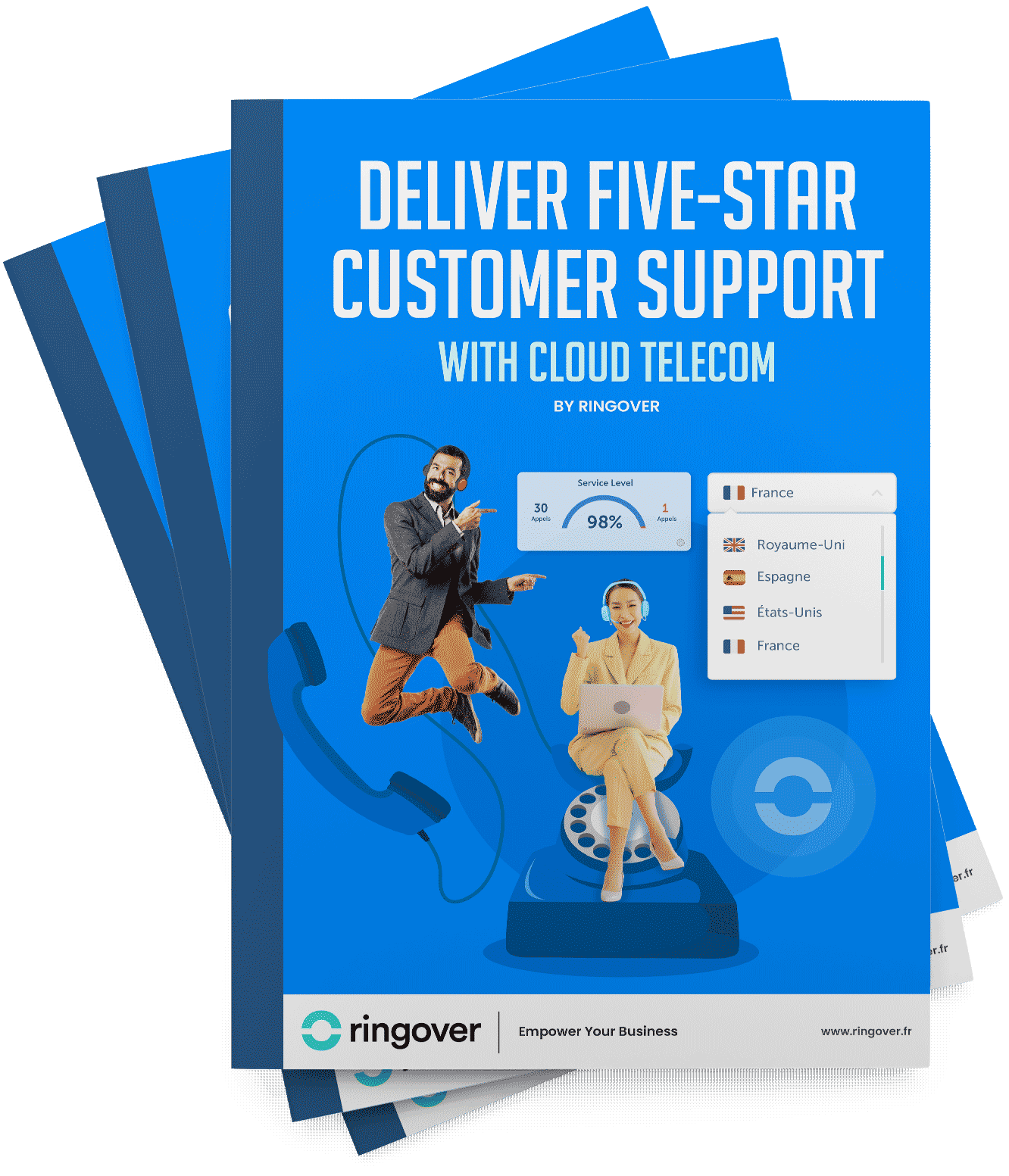Summary
This strategy goes beyond merely handling calls; it encompasses a holistic approach to call centre management, combining operational excellence with personalised service. By aligning centre operations, empowering call centre agents, utilising real-time data, and adopting advanced technologies, organisations can revolutionise how they support customers and drive satisfaction.
Optimise Your CX with Ringover
Whether managing a traditional call centre or a modern contact centre with omnichannel communications, an effective strategy is the key to scalable, successful service. It enhances agent performance, reduces average handle time, and elevates the quality of customer interactions.
This blog post explores the essential components of a winning call centre strategy, including optimising call routing, boosting team productivity, leveraging advanced call centre software, and fostering continuous improvement and quality assurance.
What Is a Call Centre Strategy?
A call centre strategy is a comprehensive plan that outlines how your centre will manage and enhance customer interactions, agent performance, and overall service quality. It's more than just a schedule or a set of processes; it acts as a blueprint for your contact centre, guiding all aspects of operations—from call routing and agent training to data analysis and quality assurance.
At its core, an effective call centre strategy links your company's broader business objectives to the activities and priorities of your support team. It defines the goals your centre aims to achieve—whether that's improving customer satisfaction, reducing average handle time, or increasing first call resolution rates—and establishes the framework for how agents and technology will work together to deliver those results.
Every successful call centre strategy begins with a clear mission that aligns with your organisation's overall vision. This mission defines the purpose of your centre and ensures that every customer interaction, whether by phone, chat, or email, contributes to a positive customer experience. Business goals—such as enhancing resolution rates or boosting employee engagement—are often set using the SMART framework, ensuring they are specific, measurable, achievable, relevant, and time-bound.
Key performance drivers, such as agent productivity, call quality, and real-time data utilisation, are continuously monitored to ensure ongoing improvement. These call centre metrics help managers and supervisors track progress, identify areas for development, and implement best practices to optimise efficiency and reduce agent turnover.
Ultimately, a well-crafted call centre strategy creates an environment where customer service excels, agents feel empowered, and every interaction strengthens your relationship with customers.
Steps to Build a Call Centre Strategy
Step 1: Define Your Goals and Objectives
Begin by clearly outlining what you want to achieve with your call centre. This could include improving customer satisfaction, reducing operational costs, increasing first contact resolution rates, or enhancing agent engagement. Ensure these goals are specific, measurable, achievable, relevant, and time-bound (SMART) to provide a clear direction for your team.
Step 2: Understand Your Customer Needs
Gather feedback from customers through surveys, post-call satisfaction ratings, and social media insights. Analyse this data to identify pain points and areas where your agents can improve. This understanding will help tailor your customer service approach to meet their expectations effectively.
Step 3: Plan Your Call Centre Setup
Consider the type of services your call centre will offer, such as customer support or technical assistance. Evaluate your target audience to ensure your operations are aligned with their needs. This includes selecting appropriate technology, infrastructure, and training programs for your agents.
Step 4: Choose the Right Technology
Select communication channels and tools that support your goals. Evaluate cloud contact centre as a service (CCaaS) solutions, which can offer scalability, flexibility, and integration with other business systems. Ensure that your technology supports real-time data analysis and reporting to monitor performance.
Step 5: Develop a Training Program
Design a comprehensive training program that equips your agents with the skills needed to deliver excellent customer service. This includes situational role-plays to prepare agents for common customer inquiries and feedback mechanisms to foster continuous improvement.
Step 6: Establish Key Performance Indicators (KPIs)
Set and monitor KPIs such as response times, resolution rates, and customer satisfaction scores. Regularly review these metrics to assess your call centre's performance and identify areas for improvement.
Step 7: Integrate Continuous Improvement
Regularly review customer feedback, agent performance, and operational efficiency. Use this data to make tactical adjustments to your strategy, ensuring it remains aligned with evolving customer needs and business objectives.
Using Technology to Support Your Call Centre Performance
Technology plays a pivotal role in enhancing call centre efficiency, agent productivity, and overall customer satisfaction. Incorporating the right tools can streamline call centre operations, offer real-time insights into centre performance, and enable your team to deliver exceptional customer service.
Ringover stands out as a versatile cloud-based call centre software designed to optimise your call management, agent oversight, and communication workflows. It offers features such as an intuitive dashboard for managing calls, seamless CRM integration, and real-time analytics that enable centre managers to monitor agent performance effectively.
Ringover simplifies call handling with intelligent routing, call forwarding, and interactive voice response systems, helping you deliver faster and more personalised support to your customers across over 65 countries.
Complementing Ringover, Empower by Ringover leverages AI-powered conversation intelligence software to transform your customer interactions. This tool provides full call transcription, semantic analysis, and automatic call summaries, allowing you to analyse communication quality deeply and refine your training and coaching processes. Empower helps identify customer needs with precision, enhancing personalisation and boosting customer satisfaction. It equips your agents with actionable insights, ensuring every call contributes positively to your overall centre strategy.
Additionally, implementing AI agents like chatbot solutions can greatly improve your contact centre management by handling routine inquiries instantly and freeing up agents to focus on more complex issues. Chatbots offer 24/7 support, reduce wait times, and enhance the customer's journey by providing quick, accurate responses. Combined with tools like Ringover and Empower, they form an integrated ecosystem that optimises both agent workload and customer experience.
By embracing these technologies—Ringover's comprehensive call centre software, Empower's AI-driven conversational intelligence, and AI agents—you create a dynamic support environment that drives efficiency, enhances real-time decision-making, and elevates every customer interaction.
20 Best Strategies to Optimize Your Call Center
- Implement AI Chatbots: Use conversational chatbots to handle common questions and simple requests, reducing call volume and enabling agents to focus on complex issues.
- Use AI Voice Bots: Deploy conversational AI voice agents to manage routine calls automatically, increasing efficiency without compromising service quality.
- Optimise Workforce Management: Schedule agents effectively to align staffing with peak call times, reducing wait times and improving service.
- Improve First Call Resolution (FCR): Empower agents with data and training to resolve customer issues during the first contact, reducing repeat calls and boosting satisfaction.
- Leverage Data Analytics: Analyse call data to identify trends, inefficiencies, and opportunities for process improvement, helping improve call routing and agent training.
- Adopt Omnichannel Support: Ensure seamless customer experience across voice, chat, email, and social media channels for consistent interactions.
- Use Real-Time Analytics: Monitor live performance metrics and customer sentiment to make immediate adjustments and improve agent coaching.
- Invest in Agent Training: Regular, targeted training enhances agents' skills, confidence, and customer handling capabilities.
- Implement Smart Call Routing: Route calls based on agent expertise and customer needs to decrease handle times and increase satisfaction.
- Promote Self-Service Options: Offer interactive voice response (IVR) and online portals allowing customers to resolve simple issues independently.
- Use Cloud-Based Software: Adopt scalable, flexible cloud solutions that enable remote agent work and easy system updates.
- Focus on Quality Assurance: Regularly evaluate calls to maintain high service standards and identify coaching opportunities.
- Enhance Agent Engagement: Use gamification and personalised coaching to keep agent morale high and reduce turnover.
- Integrate CRM Systems: Provide agents with up-to-date customer data for personalised and efficient interactions.
- Automate Routine Tasks: Use software to automate scheduling, follow-ups, and reporting, freeing agents to focus on calls.
- Monitor Average Handle Time: Track and work to reduce call durations without compromising quality to improve centre efficiency.
- Use Feedback Loops: Gather feedback from customers and agents to continuously refine processes and training.
- Foster a Culture of Continuous Improvement: Encourage innovation and adaptability to stay ahead of evolving customer expectations.
- Utilise AI-Powered Insights: Tools like Empower by Ringover can analyse conversations for sentiment and trends, guiding better decision-making.
- Benchmark Performance Metrics: Regularly compare your centre's KPIs against industry standards to identify strengths and areas for development.
Upgrading your customer service is easy when you have a comprehensive analytics dashboard to show you your strengths and your weaknesses.
Final Thoughts on Call Centre Strategy
To thrive in today's competitive market, crafting a clear and effective call centre strategy is essential. Focus on aligning your centre operations with customer expectations, empowering your agents through consistent training, and utilising advanced technologies such as Ringover and AI-powered tools for real-time insights and optimised call routing.
Make data-driven decisions a priority, consistently monitor key call centre metrics, and adopt best practices to improve both customer experience and call centre efficiency. Begin refining your strategy today to achieve better performance, greater customer satisfaction, and sustainable business success.
Call Centre Strategy FAQ
What are the 3 C's in the call centre?
The 3 C's in a call centre commonly refer to Customer, Call, and Centre. These focus areas emphasise prioritising the customer's needs, effectively managing each call interaction, and optimising the overall centre operations to deliver efficient and high-quality customer service.
By balancing these three elements, call centres can improve agent performance and enhance the customer experience.
What is the 80/20 rule in a call centre?
The 80/20 rule, also known as the Pareto principle in call centres, means that 80% of incoming calls should be answered within 20 seconds. This benchmark helps maintain service levels by reducing customer wait times and increasing efficiency. While this rule is widely used as an industry standard, it's important to note that it originated arbitrarily and serves primarily as a guideline to improve customer satisfaction and agent responsiveness.
How to make a call centre more efficient?
To boost call centre efficiency, focus on optimising call routing to connect customers with the right agents, implementing real-time performance monitoring, and leveraging technology like call centre software and AI chatbots to automate routine tasks. Training your team continuously, using data-driven insights to refine processes, and managing workforce scheduling effectively are also essential strategies for improving call centre operations and reducing average handle time.
What are the 7 important call centre skills every agent should have?
Every successful call centre agent should master these seven key skills:
- Communication: Clear and empathetic verbal and written skills.
- Problem-Solving: Ability to analyse issues and provide effective solutions quickly.
- Patience: Staying calm and courteous during challenging interactions.
- Product Knowledge: In-depth understanding of the company's products and services.
- Multitasking: Handling multiple tasks, such as documenting calls while assisting customers.
- Technical Proficiency: Comfort with using call centre software and related technology.
- Active Listening: Fully understanding customer concerns before responding.
- Developing these skills ensures agents can deliver high-quality service and contribute positively to overall call centre performance.
Published on July 11, 2025.



